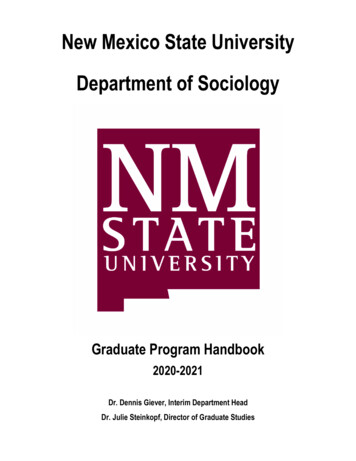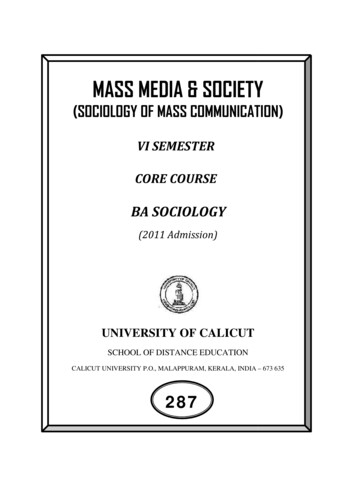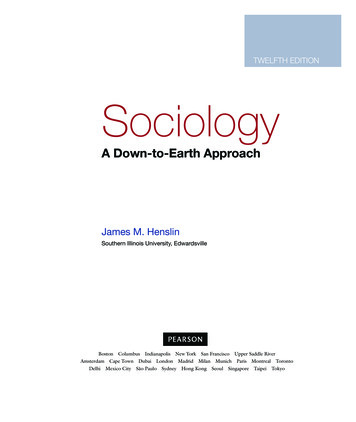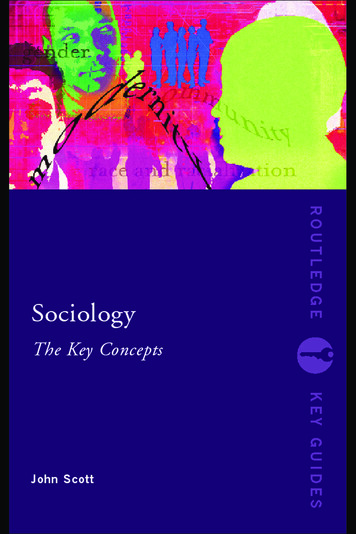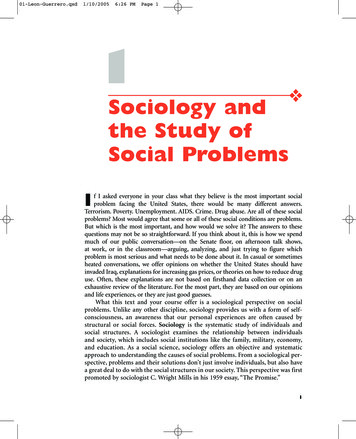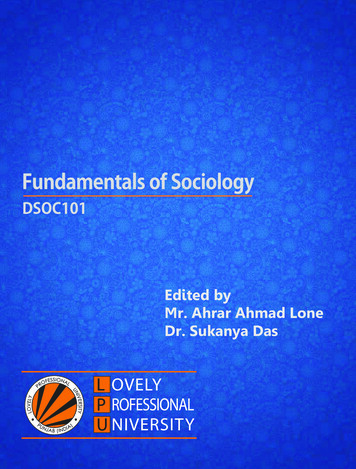
Transcription
Fundamentals of SociologyDSOC101Edited byMr. Ahrar Ahmad LoneDr. Sukanya Das
FUNDAMENTALS OF SOCIOLOGYEdited By:Ahrar Ahmad Lone and Dr Sukanya Das
Printed byLAXMI PUBLICATIONS (P) LTD.113, Golden House, Daryaganj,New Delhi-110002forLovely Professional UniversityPhagwara
SYLLABUSFundamentals of SociologyObjectives: To acquaint the students with sociology as a social science and the distinctiveness of its approach among the social sciences. To provide knowledge to the students in such a way that even if the student is without any previous exposure to sociology then he/she could acquire an interest in the subject and follow it.S.No.Topics1.Sociology: Sociology-the Study of Groups, Definition, Nature & Scope, Development of Sociology as a Discipline2.Basic Concepts: Society, Community, Institution, Association, Group, Social Structure, Status and Role, etc.3.Institutions: Marriage, Family and Kinship, Religion, Education, Politics, etc.4.5.Social System: Structural aspects of Social System, Functional Problems of Social System (AGIL), Social Functions andDysfunction, Manifest and Latent FunctionsCulture: Meaning, Elements in Culture, Cultural Systems and Subsystems, Culture and Environment, Cultural Progress,Ethnocentrism6.Socialisation: Concept of Socialisation, Process, Stages and Agencies of Socialisation7.Social Stratification and Mobility: Meaning, Forms, Functions and Dysfunctions of Stratification, and Theories; Social mobility8.Social Change: Meaning and Type: Evolution and Revolution, Progress and Development - Factors of Social change.9.Theoretical Orientations: Functionalism10.Theoretical Orientations: Marxism
CONTENTUnit 1:Sociology: An Introduction1Satyabrata Kar, Lovely Professional UniversityKirandeep Singh, Lovely Professional UniversityUnit 2:Origin and Development of Sociology38Satyabrata Kar, Lovely Professional UniversityKirandeep Singh, Lovely Professional UniversityUnit 3:Basic Concepts of Sociology73Javeed Ahmad Bhat, Lovely Professional UniversityKirandeep Singh, Lovely Professional UniversityUnit 4:Social Institutions119Javeed Ahmad Bhat, Lovely Professional UniversitySonia Sharma, Lovely Professional UniversityUnit 5:Political System138Satyabrata Kar, Lovely Professional UniversitySonia Sharma, Lovely Professional UniversityUnit 6:Educational System176Satyabrata Kar, Lovely Professional UniversityRipudaman Singh, Lovely Professional UniversityUnit 7:Religion210Javeed Ahmad Bhat, Lovely Professional UniversityRipudaman Singh, Lovely Professional UniversityUnit 8:Social System242Javeed Ahmad Bhat, Lovely Professional UniversityRipudaman Singh, Lovely Professional UniversityUnit 9:Understanding Culture-Culture and Civilization253Satyabrata Kar, Lovely Professional UniversityRipudaman Singh, Lovely Professional UniversityUnit 10:Socialization-Stages and Agencies277Satyabrata Kar, Lovely Professional UniversityUnit 11:Social Stratification and MobilitySatyabrata Kar, Lovely Professional UniversityKirandeep Singh, Lovely Professional University290
Unit 12:Social Change317Satyabrata Kar, Lovely Professional UniversityKirandeep Singh, Lovely Professional UniversityUnit 13:Functionalism364Javeed Ahmad Bhat, Lovely Professional UniversitySonia Sharma, Lovely Professional UniversityUnit 14:MarxismJaveed Ahmad Bhat, Lovely Professional UniversitySonia Sharma, Lovely Professional University371
VED1e\L-lovely-eng1\soci1-1.pmdIInd5-2-133rd 9-4-134th17-4-13Satyabrata Kar, Lovely Professional UniversityKirandeep Singh, Lovely Professional UniversityUnit 1: Sociology: An IntroductionUnit 1: Sociology: An Meaning and Definition of Sociology1.2Scope of Sociology1.3Subject-matter of Sociology1.4Sociological Perspective1.5Nature and Importance of Sociology1.6Summary1.7Keywords1.8Review Questions1.9Further ReadingsObjectivesAfter studying this unit, the students will be able to: To understand the meaning and definition of Sociology; To explain the field and subject matter of Sociology; To explain the nature and importance of Sociology; To describe the origin and development of Sociology.IntroductionThough the man lives in society from prime time yet he started late to take interest studying in hissociety and himself. First of all man studied natural events, and tried to understand the environmentof his surroundings and at last started to think about his society. This is the reason that the naturalsciences developed first and after that social sciences. In the series of development of social sciences,sociology developed as a subject after a long time. This new subject got the chance to have existencein previous century. In this view sociology is a new science comparatively the other social sciences.The experience of necessity of sociology was considered to understand the typical societies varioussocial events. Gradually the importance of this ology increased too much. In relation to thedevelopment of Sociology T.B. Bottomore wrote that from thousands of years the societies andgroups has been considered and inspected by the people in which they live. Yet Sociology is amodern science and is not old more than a century. Don Martindale tells that if man is a philosopherby nature, obviously he is sociologist also because social life is his natural aim. Man can not be aLOVELY PROFESSIONAL UNIVERSITY1
VED1e\L-lovely-eng1\soci1-1.pmdIInd5-2-133rd 9-4-134th17-4-13Fundamentals of SociologyNotessociologist only by living in society, establishing the social relation and with participating in sociallife. So it is essential to try to understand what Sociology is in fact?Sociology is the science or ology of society . Society or social life has been studied through it. Thecredit goes to the famous scholar Auguste comte, the native of France, for giving birth to this newscience. First of all only you named sociology to this new science in 1838. Due to this reason youare known as Father of sociology . Among the first writers of sociology Durkheim, Spencer andMax Weber are also known besides Comte. The contribution of all these scholars to develop Sociology as a subject, is too much.Bringing to light on the fundamental source of origin of Sociology, Ginsberg wrote that is brief it issaid that the origin of sociology is based on political philosophy, history, biological principles ofdevelopment and all those revolutions of social and political reformation which investigated thesocial states. It is clear that there is a great contribution of political philosophy, history, biologicalprinciples of development and the revolutions of social and political reformations in origin ofSociology. The origin of sociology is the result of those efforts by which the common base, findingin the various branches of social science, was found.1.1Meaning and Definition of SociologyAccording to verbal sense, we find that sociology is made of two words in which first words socious from Latin language and second one Logas from Greek language has been taken. The meaningof socious is society and science from Logas. Thus the verbal meaning of sociology is thescience of society. John Stuart Mill suggested replace Sociology in Ethology and said that sociology is the illegal child of two languages, but most of the scholars did not admit it. From theposterior of nineteenth century Herbert spencer tried to study about society orderly and named hisbook sociology . In relation about suitableness of the word sociology you wrote that the vantageof symbols and the suggestively is more important than its validity of origin. It is clear that inverbal sense, the meaning of sociology is the science in which social relations are studiedsystematically and orderly.When we think about this question what sociology is we find variety in views of various sociologists,but it is sure that most of sociologists admit sociology as science of society . Various scholars havebeen expressed their ideas to clear the meaning of sociology. The definitions of sociology given bythem can be divided into four parts as the following:1.Sociology as the study of society.2.Sociology as the study of social relations.3.Sociology as the study of groups.4.Sociology as the study of social interaction.Now we will consider on each of them here.1.1.1Sociology as the Study of SocietyThere were a few sociologists like Giddings, Samner, Ward etc., who tried to explain sociology asa science by which one can be studied as a whole unit of whole society.Note Word s views, Sociology is the science of society. According to Giddings, Sociology is the scientific study of society. You wrote that sociology issystematic description and explanation of society as a whole unit.According to Odum, Sociology is the science which studies the society. On the basis of thesedefinitions, it is clear that sociology is the scientific study of society, but a natural question arises2LOVELY PROFESSIONAL UNIVERSITY
VED1e\L-lovely-eng1\soci1-1.pmdIInd5-2-133rd 9-4-134th17-4-13Unit 1: Sociology: An Introductionhere which society has been studied by sociology either of human society or animal society orboth of them. Here we should understand clearly that human society has been studied in sociology.According to G. Duncan Mitchell, Sociology is the analytic and expository science of structuralaspects of human society. 1.1.2NotesSociology as the Study of Social RelationsWhere some scholars admit Sociology as a science of society in other hand some others call it thesystematic study of social relations, but there is no difference between science of society and socialrelations. Its reason is that system of social relations is called by the name of society. There are somedefinitions of some special scholars who accept sociology as the study of social relations.According to MacIver and Page, Sociology is related to social relations this network of relations iscalled society by us. You wrote in some other place, Social relation is the only subject theme ofsociology. According to J.F. Cuber, Sociology can be defined as the branch of scientific knowledge of humanrelationships. According to Max Weber, Sociology is the study of social relations and deeds. Expressing likethese thoughts, Von Wiese wrote, Only social relation is the virtual base of the subject-matter ofsociology. According to Arnold M. Rose, Sociology is the science of human relations. From the above definitions, it is clear that sociology is a science which studies the social relationssystematically. Only the network of social relations is called society. Man establishes innumerablesocial relations with various persons and groups on the basis of mutual awareness and contact.When several persons and groups are related with each other as various units, whatever be madeon the base of these relations, that is called society. These society and social relations are studied insociology.1.1.3Sociology as the Study of GroupsAccording to Nob s Hine and Flaming , Sociology is the scientific and systematic study of personsin groups. It is meant that Sociology gives attention to those reflection of behaviour which arefound is the people of orgnised groups. According to Johnson, Sociology is the study of socialgroups. You wrote, Sociology is the science of social groups . . Social group is a system of socialinteractions. Your acceptance is that it is not sufficient to say to Sociology as the study of socialrelations and we will not be able to reach at a definite result. So Sociology should be accepted as thescience of social relations. The meaning of social groups, according to Johnson, is not only the groupof persons but it is the systematic interaction which create among people. When various personscontact each other, social interaction are created in them and the groups are made on the basis ofthese interactions. So Sociology is the study of these social relations which are based on socialinteractions. In sociology Johnson gives importance to social relations which are the result of socialinteractions. You wrote Our interest in the people in sociology is till that where they participate inthe system of social interactions. It is clear that in the construction of groups, the social interactionsare as a base and these are studied in sociology.Why the importance is given to the study of social groups in sociology, too much we shouldunderstand it here. Man lives in group and participates its various activities and fulfills his needs.He participates in family group, groups of relatives, group of caste, group of playmates, group ofneighbours, group of school, group of professional action, group of religion and group of politicalaction and development happens here. Among them every group is a system of social interaction.So when we study the social groups in sociology, we accept the importance of systematic study ofsocial interactions indirectly.LOVELY PROFESSIONAL UNIVERSITY3
VED1e\L-lovely-eng1\soci1-1.pmdIInd5-2-133rd 9-4-134th17-4-13Fundamentals of SociologyNotes1.1.4Sociology as the Study of Social InteractionsSome sociologists define sociology as the study of social interactions. They accept that socialinteractions are the base of society instead of social relations. The number of social relations are toomuch to study correctly. So the social interactions should be studied in sociology. To have contactof two or more persons or groups with each other in the state of awareness and to effect the behaviourof each other is interaction. The only base of social relations is interaction. This is the reason whySociology is the science of social interactions.According to Gillin and Gillin, In wide meaning, sociology is called the study of interactionswhich are produced in people by contact with each other. According to Ginsberg, Sociology is the science of manual interaction and inter-relations and oftheir states and results. According to George Simmel, Sociology is the science of forms of humen interrelations.From the above definitions it is clear that sociology is the science of social interactions. Some otherscholars have defined sociology as following:According to Max Weber, Sociology is that science which tries to know the analytical explanationof social action. According to you, it is difficult to understand Sociology without knowing socialactions. The reason is that where sociology has a great importance of social relations and socialinteractions, one can not understand social actions without knowing it. Both are difficult tounderstand. Social interactions are itself made by social actions. So Max Weber compels one tounderstand social actions in sociology. The study of social action in Sociology is given a greatimportance by Talcott Parsons. You acceptance is that the whole social structure, social relations,society and social system can be understood by the medium of retention of action .According to Sorokin, Sociology is the common science of social-cultural events, kinds and severalinter-relations . You tell somewhere that Sociology studies those directions of society which arerecurrent, permanent and universal and are related with the subject-matter of every social science,but any of social science does not study them specially. In its broad form sociology is the science which studies social system. Social system includes socialactions, social relation, social control, social change, social institutions and the related effect andconditions of it. In other words, Sociology is that science which studies the various aspects relatedwith social system.On the basis of above definitions it is said that, Sociology is the science which studies the entire unitof the whole society. Sociology is the science of the study of an integrated unit of entire society. Inview to understand social relations correctly the study of social interactions and social values arespecially compelled to be real in sociology.1.2Scope of SociologyEnkals says, Sociology studies the changeable society, so neither then limit of study can be settlednor the field of study can be defined clearly of sociology. The meaning of field is that from wherethis science has been spread. In other words, the meaning of field is connected with those possiblylimits is which any subject or science can be studied. The views of scholars about the subject field ofSociology can be divided into two parts:(i)Formal or specialistic or particularistic school and(ii)Synthetic school.According to first view or concept Sociology is a special science and according to second oneSociology is a common science. We try to clear here every concept of them.4LOVELY PROFESSIONAL UNIVERSITY
VED1e\L-lovely-eng1\soci1-1.pmdIInd5-2-133rd 9-4-134th17-4-13Unit 1: Sociology: An Introduction1.2.1NotesFormal SchoolThe founder of this school is George Simmel, a sociologist of Germany. Vierkant, Von Wiese, MaxWeber and Taneej are some of those scholars which are related to this school. The related sociologistsadmit that sociology is also a free and special science like political science, geology, economics,history, physics, chemistry etc. Like every science has its own special problem or matter and isstudied by that ology, as there should be a main matter or problem to study in sociology also. Withthis happening sociology could be a specific and free science and the field could be definited. Thefollowers of this school says that if sociology is trial to be the study of whole society then it will notpossible to do on the scientific base. In that situation sociology will become a hotchpotch. So it isnecessary to make sociology as a specific science, that the specific forms of these relations are studiedinstead the study of the whole social relations in it. Due to this compulsation of formal field ofsocial relations, it is called formal school. There are some thoughts of some special scholars relatedwith this school as:1. Views of George Simmel: George Simmel wanted to make sociology a special science. Youconsider sociology is the study of forms of social relations.Views of George Simmel: George Simmel wanted to make sociology, a special science. Accordingto him sociology is the study of form of social relations. For him, if sociology starts the study ofcontent of social relations like the other sciences, it could not be a special science. So sociologyshould study the forms of social relations. According to him elemental and non-elemental thingshave their own form effect of form and content to each other. Form and content do not have anyeffect on each other. For instance the three bottles, having the same form, can be filled with water,milk and wine separately. There will be no effect of water, milk and wine on the form of bottles andtheir form on the content of bottles (water, milk and wine). The special shape of bottle is its formand contained water, milk and wine is its content. Similarly the difference is found between theform of social relations and contents and they do not effect each other. The main forms of socialrelations are imitation, co-operation, competition, domination, sub-ordination, division of labouretc. Sociology is the science which studies that forms of social relations. When these forms of socialrelations are found in different contents like economical association, religious association. PoliticalParty, these are studied in economics, political science and ethology not in Sociology.So sociology should study only the forms of social relations, not of contents. According to Simmel,the contents of social relations and the forms of social relations in sociology as a special science arestudied in other social sciences.Views of Vierkant: Vierkant was also a supporter to make sociology, a special science. He has toldif sociology is saved from the charges of unexplicity and indefinitly, it should not study the solidsociety in historical view. Sociology, as a special science, should study the forms of mental relationswhich tied the people each other. Sociology does not consider what is the relations between fatherand son or mother or daughter? It only studies of fame, regards, love, shame, affection, dedication,jealousy, co-operation, struggle which are part of mental and emotional fold. The various socialrelations are formed with these basis and the society is developed by these social relations. Sosociology should reserve itself to the forms of mental and emotional facts or relations. Vier Kanthimself wrote, Sociology is the study of last forms of those mental relations which tied the menwith each-other. Views of Von Wiese: Von Wiese was also in favour to make sociology, a special science like Simmel.For him, Sociology is the especial social science which is the study of the forms of human relationsand it is its especial field. Describing the 650 forms of social relations, you have told, sociologyshould study these forms.Views of Max Weber: Max Weber defines Sociology as especial science. According to him Sociologyis the study of social activities. He has explained the social activities as those behaviours which aremeaningful, in additional, which are affected by the behaviours of other persons. For him, behaviourLOVELY PROFESSIONAL UNIVERSITY5
VED1e\L-lovely-eng1\soci1-1.pmdIInd5-2-133rd 9-4-134th17-4-13Fundamentals of SociologyNotesis the basis of social activities. So the work of Sociology is to understand and explain the socialbehaviour. According to him, the rules can be constructed or formed based on experience andargument in sociology from huge explanation and analysis of social actions. He tells that if thewhole social relations are studied in Sociology, its field will become limitless and inexplicit. So it isessential that the study of social relations should be studied in a definite limit. In this view, MaxWeber accepts that in sociology, social actions are studied only.In the other supporters of formal school, the name of Tonies, Bogle, Ross Park, Bargess etc. aredescribed. All the scholars, related with this school, admit that the field sociology is the study of theforms of social relations. All the above scholars always tried to make Sociology, as a free and specialscience from the other social science.Criticism of Formal School: Formal school is blamed by indefinity and unexplicity. About thesupporters of this school, Fichter says that it is true to call social philosopher them instead ofsociologist because they did not try to understand the behavioural nature of social life. The drawbacksof this school are following:1. It is wrong to say from the scholars related with formal school that the forms of social relationscan not be studied by the help of other science. So sociology should study them as a new science.Such saying is baseless. A lot of forms of social relations like superiority, lordship, administration,power, obeying, slavery, struggle etc. are studied more systematically in the lawbook. Sorokinwrote, Forms are studied by other sciences also. So there is no place for the science of forms ofhuman relations in Sociology. 2. The followers of this school has differentiated in between the forms and contents and separatedfrom each other but it is not possible to separate from each other. In this connection Sorokin wrote, We can fall a glass with wine, water or sugar without changing its form but I can t imagine abouta social institution that its form will not be changed after exchanging its members. Its is clear whenthe form and context can not be separated from each other in the field of social relations, it is notpossible to study the forms of social relations in Sociology.3. The supporters of this school want to make Sociology a free and pure science differ from all theother social sciences, but it is not possible. The reason is that mutual dependence is found in varioussocial sciences. All the social science gains something in less or more amount from each other. Inthis connection Sorokin wrote, Perhaps there is no science which is not related with other sciencesin any form. 4. Accepting Sociology, a new science, the followers of this school insist to restrict its learning field.According to them, the field of learning of sociology is limited to the specific forms of social relation,but they are not right about it. It according to the respect of this school only the forms of socialrelations are learnt in Sociology, the various sides of social life will not be in sociology. In thiscondition its field will be limited which is not proper to development of subject.5. In wide sense, Sociology is the science of society. It is proved that the various sides of social lifeare attached firmly with each other. If any part or side of social life has been changed, it effects theother parts or sides. So according to the supporter of this school, it is not good to study the forms ofsocial relation in Sociology by pressure, it is ignorance of the other sides of social life which is notproper in any way.6. The followers of this school have not differentiated between the forms of socialization and theforms of social relations and accepted as a synonym of each other, while it is not in real. Not onlythe forms of socialization is contained by social relations but the forms of in socialization also. It isclear that views of this school are not right. Its followers are unable to clear the field of study ofsociology.Auguste Comte is known as the founder of sociology.6LOVELY PROFESSIONAL UNIVERSITY
VED1e\L-lovely-eng1\soci1-1.pmdIInd5-2-133rd 9-4-134th17-4-13Unit 1: Sociology: An Introduction1.2.2NotesSynthetic SchoolSorokin, Durkheim, Hobhouse and Ginsberg are the main supporters of this school who supportto make Sociology a general science instead of a special science. According to these followers thefield of sociology can not be limited with the forms of social relations for getting whole knowledgeabout the society. It has to study the whole society and in this relation the followers of this schoolhave given two reasons:1.The nature of society is same as living being of which the various organs are intimately relatedwith each other and changes in any organ effects the other. So to understand the society, it isessential to understand its various units or organs and their mutual relations. It can happenonly when sociology becomes a general science with broad field.2.An another reason is given in favour to be Sociology, a general science, that a part of society isstudied from each social science. For instance political life, a side of a society, is studied inpolitical science, similarly economical life in economics. There is no science which studies allthe sides of social life or the whole society in broad form. So Sociology has to work as ageneral science. The real nature of society can be understand by this happening. Our knowledgewill be contract and solitary. In fact sociology has to play a role to introduce the people withgeneral states of social life and only it is possible when its field becomes broad as a generalscience.The views of some main followers are being given to understand clearly the views of this school.1.Views of Hobhouse: Sociologist Hobhouse from England is the main follower of syntheticschool. According to him sociology has to find the general elements found between chiefprinciples and gist elements of the other social science and to generalization them. Sociologyhas to establish co-ordination among various social sciences as a general science. Sociologycan do this work as following:(i) To get knowledge of the general forms of the chief concepts of all the social sciences.(ii) To know the factors of changing and stably of the society.(iii) To know the tendency and conditions of social development.It will be possible when sociology becomes a general social science.2.Views of Durkheim: French sociologist Durkheim has also followed the synthetic concepts.He told that it was possible to make a general Sociology which were made from more generalrules on the rules of special field of special sciences. Only these, in collective form, lead thevarious sides of social life. By studying them one can understand the society correctly.Durkheim wrote, It is believed that there is a great need for the sociologists to be familiarwith the investigations done in special sciences like the history of law, traditions and religion,social-arithmetic, economics etc. Because sociology should be made only with the appliancesavailable in them. Though Durkheim favours to make sociology, a general science but youhave cleared that first have to made sociology a special science so that it may develop its ownfree rules like other social sciences. After that it has to establish co-ordination with the othersocial sciences as a general science. So first of all you pressed to study those social facts insociology by which social representation is made. According to you, Sociology is the scienceof collective representation. According to Durkhiem the meaning of collective representationis to the set of views emotions and concepts which are found in every group or society onwhich the person depends for his views, humours and behaviour in insensitive form. Mostlythe people of society accepts them. According to Durkheim, these views, emotions andconcepts change into a collective strength. You named it collective representation.They lead the various sides of social life in collective form and studying them one can understandsociety correctly. There are two specialities of collective representation:(i) They extend in all society and are above the strength of man.(ii) They effect all the people of the society essentially.LOVELY PROFESSIONAL UNIVERSITY7
VED1e\L-lovely-eng1\soci1-1.pmdIInd5-2-133rd 9-4-134th17-4-13Fundamentals of SociologyNotesSociology should study these collective representations so that knowledge may get about varioussocial problems and conditions.3.Views of Sorokin: He also a supporter to
SYLLABUS Fundamentals of Sociology Objectives: To acquaint the students with sociology as a social science and the distinctiveness of its approach among the social sciences. To provide knowledge to the students in such a way that even if the student is without any previous exposure to sociology then he/ sh
